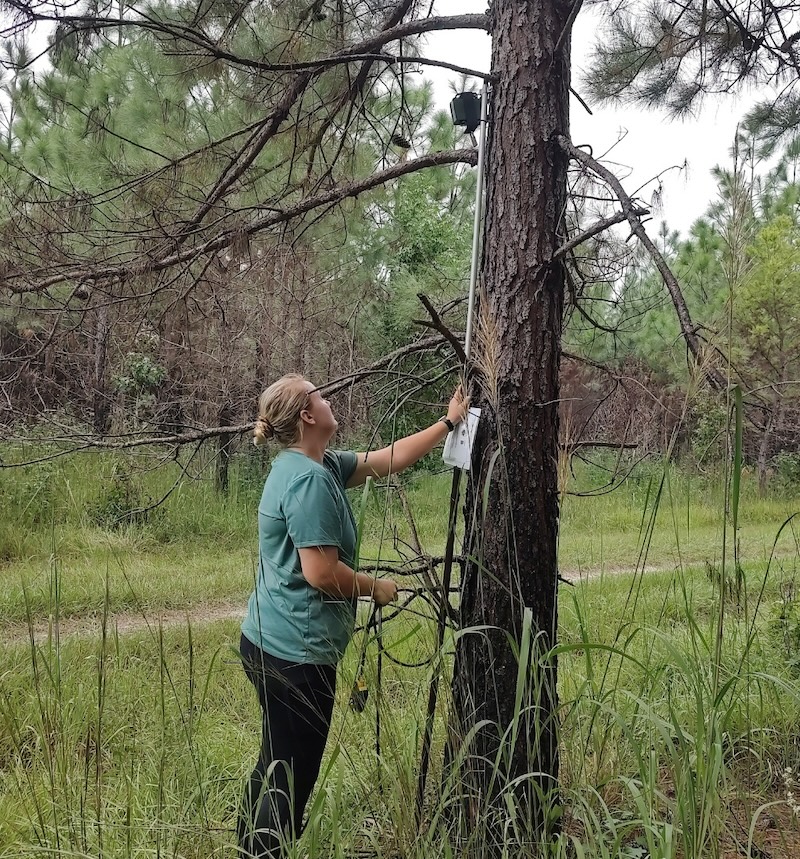

KENNESAW, Ga. | Nov 14, 2024

During walks in Marietta’s Laurel Park with her grandmother, Larkin learned about the plants and animals she saw. She applied that knowledge first as an Honors biology major at KSU, and now as a second-year student in the Master of Science in Integrative Biology program.
“She really laid the foundation for me. I have to credit her for it,” said Larkin, who earned her bachelor’s degree in Spring 2023. “In elementary school I read almost all the nonfiction books about animals and plants just because that's what interested me. In high school, I took almost all the science classes, so when I got to college, I decided on biology because of my love for animals.”
Larkin’s master’s project has taken her to a different outdoor environment—the mosquito-infested forests in the coastal Lowcountry of South Carolina. There, she studies the effects of urbanization on bats and what factors can help these important flying mammals flourish. Bats eat bugs and pollinate some plants while distributing seeds for other plants, helping strengthen the ecology of those areas.
“We’re figuring out what aspects of urbanization support bat diversity so we can bring our findings to developers and land managers,” she said. “With this information we can propose not clear-cutting the trees bats live in and using downward-facing lights since bats are nocturnal. Just anything that can support bats.”
As an undergraduate, Larkin took classes from professor of biology Thomas McElroy, who has worked with the Palmetto Bluff Conservancy in South Carolina. That’s how Larkin ended up setting up bat monitoring devices at Palmetto Bluff Resort, among other places around Bluffton, S.C., to gather the information for her project and to foster bat diversity.
McElroy touted Larkin’s skills both inside and outside the lab. Originally committed to a lab-based project, Larkin’s work shifted to the field, where she showed adaptability in learning to program the acoustic monitors critical for monitoring bat behavior and assembling the data for her study.
“Kerrigan is a hard worker,” McElroy said. “She designed her experiment, and we will work on analysis of the data in the spring. Her project changed focus, and she quickly learned a new skill set and took ownership of the project.”
Larkin said McElroy’s support made KSU an easy choice for continuing her studies. She pointed out a warmth and collaborative spirit at KSU that helped her find a community in McElroy’s lab and in the classrooms.
“You aren’t just a number or just another student at KSU. There are so many professors who truly care about you and your success,” she said. “The connections I have made with my fellow students and the faculty has really enriched my experience and made my time here enjoyable. Because of the diverse opportunities for involvement, I have grown personally and academically.”
– By Dave Shelles
Photos provided
A leader in innovative teaching and learning, Kennesaw State University offers undergraduate, graduate, and doctoral degrees to its more than 51,000 students. Kennesaw State is a member of the University System of Georgia with 11 academic colleges. The university's vibrant campus culture, diverse population, strong global ties, and entrepreneurial spirit draw students from throughout the country and the world. Kennesaw State is a Carnegie-designated doctoral research institution (R2), placing it among an elite group of only 8 percent of U.S. colleges and universities with an R1 or R2 status. For more information, visit kennesaw.edu.